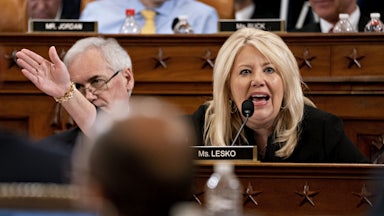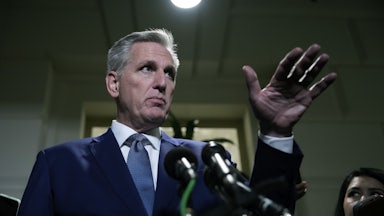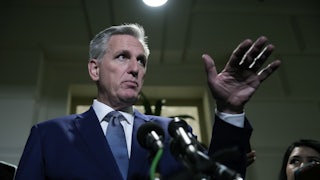Representative Kevin McCarthy announced on Wednesday that he would step down at the end of the year, roughly two months after he was removed from his position as speaker. His nine-month tenure as speaker was the culmination of his nearly two-decades-long career in Congress, a position he only won after struggling through 15 rounds of votes in January in order to secure the necessary support from the members of his own party.
It was a brief reign with an ignominious end. Since every Democrat joined eight Republicans in voting to oust McCarthy in early October, the California lawmaker has mainly trucked along, denying reports that his days in the House were numbered. But in an op-ed in The Wall Street Journal this week, McCarthy said that he would leave the House, adding that he “will continue to recruit our country’s best and brightest to run for elected office.”
McCarthy’s departure complicates the task of his successor, Speaker Mike Johnson. After the expulsion of Representative George Santos, Republicans hold 220 seats, a razor-thin majority. If a Democrat replaces Santos in the February special election, Johnson will have only a two-seat margin. (Two other representatives, a Democrat and a Republican, will also step down in February.)
McCarthy is the second high-profile Republican this week to announce his plans to retire; Representative Patrick McHenry, the chair of the House Financial Services Committee who served as acting speaker pro tempore for three weeks before Johnson’s selection, has also announced that he will be stepping down at the end of his term. But McCarthy and McHenry are just two of dozens of representatives on both sides of the aisle who have announced their intent to leave the House. These departures could indicate growing frustration with the dysfunction of the House, even among its longtime members.
Some in the House see McCarthy’s announcement as a reaction to the partisan divisions in the chamber. “His ouster from the speakership and his decision to retire from the House are the product of a Congress in which polarization has become the norm and trust the exception,” Representative Steny Hoyer, a Democrat who became friendly with McCarthy while they both served in leadership, said in a statement. (Hoyer voted along with every Democrat to remove McCarthy as speaker.)
Representative Dan Kildee, who will retire from his Michigan district at the end of his term, told me that he made his decision based on “personal considerations” but acknowledged that “the environment has changed.”
“It’s an angry place, and there are too many people here that don’t care about getting anything done. They just want to call attention to themselves,” said Kildee, who was first elected in 2012, succeeding his uncle, former Representative Dale Kildee.
“It’s changed more in the last 11 years than it did in the 36 years that my uncle served,” Kildee continued. “I do try not to be overly partisan, but it’s really hard to erase the reality that the most extreme or deranged members of the Republican side are not marginal members anymore. They’re quite in control.”
The first year of the 118th Congress included several contentious battles: the 15 rounds of votes to elect McCarthy speaker in January; the late-spring duel over raising the debt ceiling; the September fight to keep the government funded for a month and a half; the ouster of McCarthy and the struggle to find a replacement in October; the second reckoning over spending that kept the government funded in a piecemeal fashion through early 2024; negotiations over a must-pass annual defense authorization bill; and current efforts to reach a deal on a supplemental funding package, including aid to Ukraine, Israel, and Taiwan, along with a change in immigration and border policy.
“Right now, Washington, D.C. is broken; it is hard to get anything done,” said Representative Debbie Lesko in an October statement announcing her retirement.
Representative Dusty Johnson, the chair of the mainstream Republican Main Street Caucus*, considered the wave of retirements within the context of a more traditional workplace. “When somebody leaves their law office to go someplace else, there is usually some sense of frustration as a part of that, right? I mean, perfectly happy people don’t look for new opportunities,” Johnson said. “The baseline is, people are more likely to leave a workplace if they’re frustrated. So we shouldn’t be shocked if those who are leaving are frustrated. I think we want to know his level of frustration higher than the baseline.”
When I asked whether he believed the House amounted to a toxic workplace, Johnson wryly responded that it can be a difficult job but members of Congress are not getting their hands dirty or working an overnight shift at a convenience store—meaning that the American public might not be looking at their plight with an abundance of pity.
“I just feel like we need more emotional maturity about how we treat our work,” Johnson said. “I would feel terrible if we had a higher than normal level of resignations because people felt like this still wasn’t an important way to make a difference.”
Senator Markwayne Mullin, an ally of McCarthy who served in the House before his election to the Senate in 2022, suggested that the departures may have more to do with personal considerations than frustrations with the functioning of the House. If representatives see their longtime friends retiring, they may also be inclined to reconsider their future in the chamber. “Those relationships matter. And as you lose relationships, sometimes you just don’t have the energy to go back through and rebuild them all,” Mullin said.
The departure of committee chairs like McHenry and Representative Kay Granger, the chair of the House Appropriations Committee, will mean a loss in institutional knowledge. (Granger, who is 80 years old, is also reaching the end of a term limit for leading a committee.) But in a statement on Tuesday, McHenry said that concerns about the wave of departures in the House are “exaggerated.”
“I truly feel this institution is on the verge of the next great turn,” McHenry wrote. “Evolutions are often lumpy and disjointed, but at each stage, new leaders emerge. There are many smart and capable members who remain, and others are on their way.”
Another friend of McCarthy in the Senate, North Dakota Senator Kevin Cramer, said that he didn’t necessarily believe the wave of departures indicates “the good people” are “fed up” with the House. “I don’t think Kevin would be stepping down if he was still speaker,” Cramer acknowledged. “I don’t know that I’d read a lot into it in totality, though. At least not yet.”
For his part, Representative Derek Kilmer, another Democrat who is retiring at the end of his term, sounded hopeful about the future of the House. “There are more people invested today in wanting to see the institution improve than as long as I’ve been doing this,” Kilmer said. “There’s an appetite for reforms, there’s an appetite for trying to get [to] a semblance of civility and productivity. Because I think there’s an understanding that more can be done to have the institution punch at its weight.”
*This article has been corrected to reflect that Johnson is the chair of the Republican Main Street Caucus, not the Republican Governance Group.










